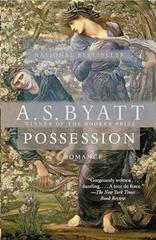 British author, critic, and Booker winner A.S. Byatt (Dame Antonia Susan Duffy), "one of the most significant writers and critics of our time," died November 16 at age 87. Born Antonia Drabble, Byatt studied English at Cambridge, Bryn Mawr College, and Oxford. She began teaching at University College London in 1962. The Guardian noted that her first novel, The Shadow of the Sun, was published in 1964, just a year after A Summer Bird-Cage, the first novel by her sister, Margaret Drabble, "thus establishing the notorious and possibly exaggerated rivalry between them."
British author, critic, and Booker winner A.S. Byatt (Dame Antonia Susan Duffy), "one of the most significant writers and critics of our time," died November 16 at age 87. Born Antonia Drabble, Byatt studied English at Cambridge, Bryn Mawr College, and Oxford. She began teaching at University College London in 1962. The Guardian noted that her first novel, The Shadow of the Sun, was published in 1964, just a year after A Summer Bird-Cage, the first novel by her sister, Margaret Drabble, "thus establishing the notorious and possibly exaggerated rivalry between them."
Byatt's reputation grew as she embarked on the Frederica Quartet, charting the changing nature of the female experience in the 20th century with the novels The Virgin in the Garden (1978), Still Life (1985), Babel Tower (1996), and A Whistling Woman (2002). "When she broke off in the middle of this project to write Possession, Byatt found both critical acclaim and a new audience," the Guardian noted. Possession won the Booker prize in 1990, becoming a bestseller both in the U.K. and U.S. The Children's Book (2009) was shortlisted for the Booker Prize and won the James Tait Black Memorial Prize.
The recipient of many awards, Byatt became a CBE in 1990 and a DBE in 1999. In 2014, a coleopterist working in Central and South America named a species of iridescent beetle in her honor (Euhylaeogena byattae Hespenheide), inspired by her portrayal of naturalists in the novella "Morpho Eugenia" in Angels and Insects (1992). Byatt received the Erasmus Prize in 2016, awarded by the King of the Netherlands.
"She was also remarkable for her generosity to younger writers," the Guardian said. "At a stage of her career when she might well have been excused for finding her own professional commitments a sufficiently heavy workload, she read new work voraciously. Her floorboards cracked under the load of novels and poems sent to her by writers and publishers who valued her approval far above that of reviewers. She could not possibly have read all of them, but she read an astonishing number."
Writing in the Guardian, Lisa Allardice observed: "She loved Europe, tennis, science, art and languages. 'I think the virtue I prize above all others is curiosity,' she told an interviewer. It is this rapacious curiosity that she brought to her 10 novels, many works of criticism and essays, and in so doing she helped change the British novel into something far more intellectually capacious and outward-looking. Hers was a life defined by literature. 'I'm more interested in books than people, and I always expect everybody else to be, but they're not.' The Dame will be greatly missed."

